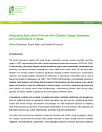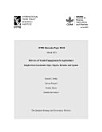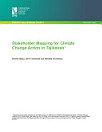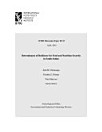Food system institutional mapping and capacity assessment in Niger
Srivastava, Nandita · Hema, Aboubacar · Babu, Suresh Chandra · Ulimwengu, John M. · Benin, Samuel
Sep 2025 · IFPRI Discussion Papers Book 2355 · Intl Food Policy Res Inst
Ebook
43
Pages
family_home
Eligible
info
reportRatings and reviews aren’t verified Learn More
About this ebook
Niger faces rampant food insecurity, malnutrition, and environmental degradation. The transformation of food systems to tackle such challenges hinges on the capacity and effectiveness of institutional frameworks. To analyze the status, challenges, and strengths of Niger’s food system, a mapping and capacity needs assessment was conducted at three levels—enabling environment, institutional, and individual. Based on the assessment, leadership concerns on strategic guidance were observed at the policy process level, with major issues such as the incidence of corruption, infrastructure constraints, and lack of reliable data availability. At the institutional level, lack of an interconnected network and mutual accountability, resource and funding constraints, and high staff turnover have adversely impacted overall institutional performance. Availability of reliable data evidence is limited or absent due to weak monitoring and evaluation systems and decentralized capacity, lack of sufficient local support, transparency issues in strategy development, and selection bias. At the individual level, there is a need to improve technical capacity on analytical thinking, quantitative and qualitative research tools, and the dissemination of communication, outreach, and information. Despite the climate change-related challenges in the country, there is less focus on environmental management, adaptation, and advanced technology implementation. The underrepresentation of key areas such as socio-cultural dynamics, governance, social protection, and cross sectoral collaboration indicates a potential lack of integration in policymaking and implementation. Overall, there is an urgent need to reallocate resources to enhance the focus on underrepresented yet critical food systems areas, enhance inter-ministerial and cross-sectoral collaboration to ensure a more integrated approach to food systems management, and incorporate social inclusion and equity considerations. Forward-looking strategies should be developed that anticipate and respond to emerging challenges such as demographic shifts, globalization effects, and technological changes.
Rate this ebook
Tell us what you think.
Reading information
Smartphones and tablets
Install the Google Play Books app for Android and iPad/iPhone. It syncs automatically with your account and allows you to read online or offline wherever you are.
Laptops and computers
You can listen to audiobooks purchased on Google Play using your computer's web browser.
eReaders and other devices
To read on e-ink devices like Kobo eReaders, you'll need to download a file and transfer it to your device. Follow the detailed Help Center instructions to transfer the files to supported eReaders.










